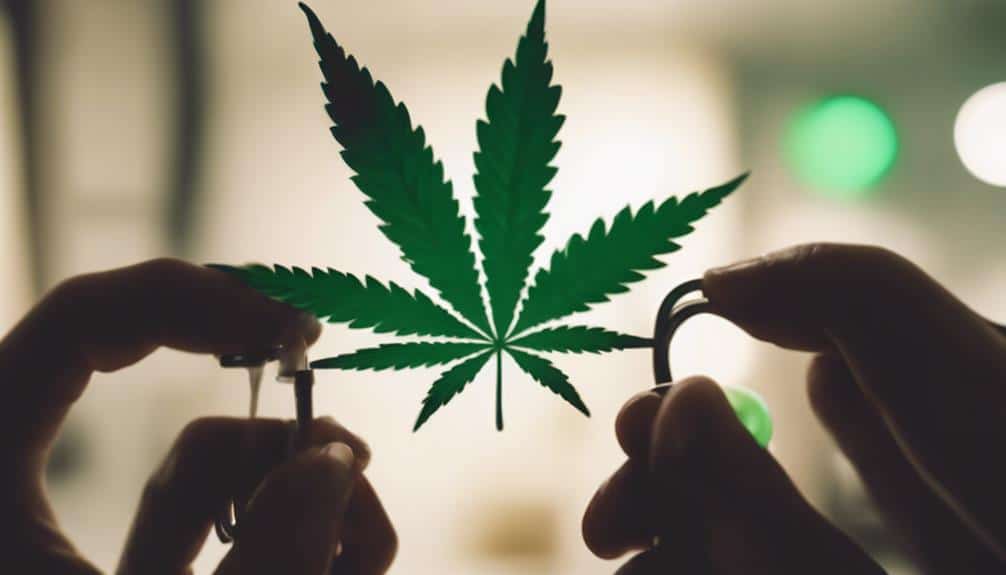Consider Jane, a Delaware resident living with chronic pain, who’s found relief in an unexpected place – cannabis. You might be wondering how a plant once stigmatized and illegal is now a lifeline for people like Jane. Well, it’s not as controversial as you might think; cannabis offers a natural pain management method with fewer side effects than traditional opioids. But why stop there? There’s much more to uncover about the role of cannabis in managing chronic pain, especially within the context of Delaware’s medical marijuana program.
Table of Contents
Understanding Chronic Pain

To understand the potential role of cannabis in managing chronic pain, it is essential to grasp the complexity of this long-term health issue that affects millions globally. Chronic pain isn’t merely a symptom but is considered a disease itself, categorized into distinct types.
Nociceptive pain results from tissue damage while neuropathic pain arises from nerve damage; these are two primary types of chronic pain. These are prevalent in conditions like arthritis and diabetes respectively. There’s also psychogenic pain which doesn’t have a physical origin but is no less real to those experiencing it.
Theories about how we perceive pain can shed light on why chronic pain persists. The Gate Control Theory suggests that our nervous system can ‘block’ or prevent certain signals from reaching the brain. However, this gate may malfunction in individuals suffering from chronic pain, allowing these signals to flood the brain unchecked.
Understanding these complexities equips you to appreciate the potential of cannabis, a plant known for its analgesic properties, in managing this debilitating condition. This knowledge can guide your efforts to serve those battling chronic pain, providing them with more effective and personalized care.
Traditional Pain Management Methods
Before exploring the potential of cannabis for pain management, it’s crucial to examine traditional methods currently in use and their effectiveness. Often, these methods fall into three main categories:
- Pharmaceutical Drugs: Opioids are typically prescribed as a common choice for pain management. However, the risk of opioid dependence is high, leading to potential addiction and other health complications.
- Over-the-Counter Medicine: Non-prescription drugs such as ibuprofen can provide temporary relief but aren’t designed for long-term use and can cause serious health issues when misused.
- Non-Pharmaceutical Therapies: Techniques like physical therapy, acupuncture, and cognitive-behavioral therapy offer a less invasive approach to managing pain.
Each method has its merits but also comes with significant drawbacks. The risk of opioid dependence underscores the need for safer alternatives. Over-the-counter medicines are easily accessible but aren’t designed for chronic conditions. Non-pharmaceutical therapies are safer but don’t always offer sufficient relief.
The traditional methods need to be supplemented or even replaced with alternatives that provide safer long-term relief for chronic pain sufferers.
Cannabis: A Natural Alternative

Now, let’s turn our attention to cannabis, a natural alternative that’s gaining traction as a potential solution for managing chronic pain. As you delve into the world of cannabis cultivation, you’ll uncover a vast network of scientific research and medical applications that are transforming the way we approach healthcare.
Cannabis cultivation isn’t just about growing plants. It’s a meticulous process aimed at producing strains with specific therapeutic applications. The cultivation process involves selecting the right strain, providing optimal growing conditions, and harvesting at the right time to ensure the highest potency and efficacy.
The therapeutic applications of cannabis are equally intriguing. It’s not just about getting high. Certain strains of cannabis are known for their powerful anti-inflammatory and analgesic properties. They’re used to manage ailments ranging from arthritis to multiple sclerosis, and even cancer. Moreover, cannabis is also being explored as an alternative to opioids which are notorious for their addictive properties and side effects.
Cannabis poses a promising future in the realm of pain management. However, it’s necessary to continue researching and refining its therapeutic applications to fully exploit its potential.
How Cannabis Provides Relief
To comprehend how cannabis provides relief, it’s crucial to understand its interaction with our body’s endocannabinoid system – a complex cell-signalling system playing a key role in regulating various functions including pain perception:
- Endocannabinoid System Interaction: When you consume cannabis, cannabinoids bind with receptors in your endocannabinoid system helping decrease pain and inflammation while affecting how you perceive pain.
- Cannabis Strain Selection: Different strains have varying levels of cannabinoids which interact differently with your endocannabinoid system. By carefully selecting the right strain, you can optimize its therapeutic effect and manage chronic pain more effectively.
- Dosage and Administration: The amount of cannabis consumed and the method of administration can affect the relief you experience. Finding the right balance ensures maximum pain relief without unwanted side effects.
Cannabis Laws in Delaware

Navigating cannabis laws in Delaware can be challenging as they’ve evolved significantly over the years. In 2015, possession of up to an ounce of marijuana was downgraded to a civil infraction akin to a parking ticket, reflecting a more tolerant attitude towards recreational use. However, recreational use remains illegal and can lead to hefty fines or even jail time.
While recreational use is illegal, Delaware has a comprehensive medical marijuana program for registered patients who follow specific guidelines. However, acquiring cannabis outside this program is still risky.
Despite these changes, full legalization is still not achieved. Several legislative attempts to legalize recreational use have fallen short but continued discussions signal a shift in public and political opinion. It’s clear that lawmakers are grappling with potential benefits and drawbacks.
Accessing Medical Marijuana Locally
To access medical marijuana in Delaware, one must understand specific guidelines and procedures within its medical cannabis program which involves patient registration process and local dispensaries overview:
- In the patient registration process:
- You must first have a qualifying medical condition as defined by the Delaware Medical Marijuana Act.
- Obtain a written certification from a physician who has an established physician-patient relationship with you.
- Apply to the Delaware Department of Health and Social Services (DHSS) to obtain your Medical Marijuana Card.
- Once you have your card, you can utilize local dispensaries overview. There are several state-licensed dispensaries, also known as compassion centers, where you can purchase medical marijuana. These dispensaries offer a variety of cannabis products ensuring you find the most appropriate method for your needs.
Risks and Side Effects

Despite potential benefits, it’s crucial to be aware of risks and side effects that may accompany the use of medical cannabis. One key concern is cannabis dependency. Like any other substance, chronic use can lead to physical and psychological dependence. It’s essential to understand that while helpful in managing pain, cannabis isn’t a cure-all and should be used responsibly.
The mental health impacts of cannabis use can’t be ignored either. While some users report relaxation and relief, others have experienced mood changes, anxiety or even paranoia. The effects on mental health vary widely based on individual physiology, strain used and method of consumption.
In addition, common side effects include dry mouth, dizziness and impaired motor skills which may be more pronounced in older patients or those with pre-existing health conditions. Therefore, it’s important to consult a healthcare professional before using cannabis for chronic pain management. They can provide objective advice tailored to your specific needs and circumstances.
Patient Testimonials in Delaware
While scientific data and medical opinions offer insight into the efficacy of cannabis for chronic pain, real-life stories from patients in Delaware further illuminate its potential benefits and drawbacks.
Delaware residents have shared their experiences in Patient Advocacy Groups, detailing their journeys with medical cannabis and chronic pain. These testimonials reveal three common themes:
- Pain Perception Variations: Many patients report a significant decrease in pain intensity after using cannabis. However, effectiveness varies among patients underlining the subjective nature of pain perception.
- Improved Quality of Life: Beyond pain relief, patients often describe an enhanced quality of life including better sleep, increased activity levels and improved emotional wellbeing.
- Challenges and Drawbacks: Despite benefits, some patients express concerns over social stigma, cost of medical cannabis and fear of potential side effects.
These patient testimonials provide valuable insights into real-world use of cannabis for chronic pain. By listening to these experiences you can better understand complexities of pain management and role that cannabis can play in it. However, it’s essential to remember that each patient’s experience is unique requiring a personalized approach to treatment.
The Medical Community’s Perspective

In the evolving landscape of pain management, it’s crucial to consider the medical community’s perspective on cannabis use for chronic pain. While many patients advocate for it, there are physician reservations that merit attention.
Primarily, these reservations revolve around lack of comprehensive clinical research and potential for misuse. These concerns are valid and must be taken into consideration when exploring cannabis use for chronic pain relief. Physicians are responsible for their patients’ health and want to ensure they’re prescribing safest and most effective treatments.
Prescription challenges also play a significant role in this conversation. Cannabis is still classified as a Schedule I drug federally putting physicians in a precarious position when prescribing it. They must balance their commitment to patient care with legal implications of cannabis use.
The potential for adverse side effects, drug interactions and dependency also pose prescription challenges. It’s a complex issue requiring careful thought and consideration.
Therefore, while cannabis may offer promising alternative in chronic pain management, the medical community has valid concerns that need addressing for sake of their patients’ overall wellbeing.
The Future of Cannabis and Pain Management
Looking ahead, the future of cannabis in pain management holds promise but is also fraught with challenges that need addressing. As you navigate this emerging field keep in mind these key areas:
- Cannabinoid Research Advancements: Scientific progress is crucial; stay updated on new findings as they can alter landscape of cannabis use for pain relief.
- Cannabis Cultivation Techniques: With changing laws and societal attitudes cultivation techniques are becoming more refined; understanding these can help ensure access to quality products for patients.
- Regulation and Policy: As a healthcare provider you must be aware of legalities surrounding cannabis use. Policies can change rapidly and your adaptability is essential for benefit of those you serve.
In the end, the future of cannabis in pain management lies in your hands. It’s a complex evolving field where your dedication to staying informed can truly make a difference. By focusing on cannabinoid research advancements, cannabis cultivation techniques and regulatory changes you can help shape a future where cannabis is a viable option for those seeking relief from chronic pain.
Conclusion
As Delaware residents grapple with chronic pain, cannabis emerges as a game-changer. But is it the ultimate answer? The jury’s still out. While it offers natural respite its long-term effects remain under scrutiny. Meanwhile testimonials and medical perspectives are encouraging. As the future unfolds will cannabis redefine pain management? Stay tuned as we continue to delve into this intriguing topic providing objective detailed analysis for your discernment.
We warmly invite you to learn more about this exciting realm of potential relief at Cannabis Docs of Delaware. We offer insights and information that could help you understand more about role of cannabis in managing chronic pain. If you prefer a personal touch give us a call at (855) 420-6797; we’re always here to offer friendly ear and answer any questions you might have.

